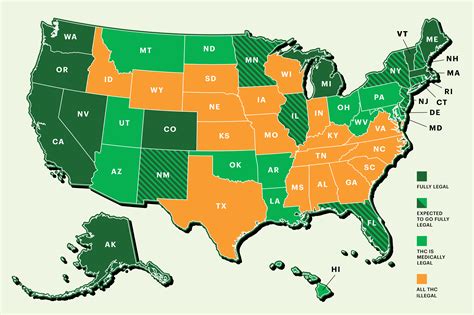The landscape of marijuana regulation in the United States is evolving rapidly, with a widening policy gap between federal laws and state legislations. As of March 1, 2023, 21 states, along with Washington D.C., Guam, and the Northern Mariana Islands, have enacted laws permitting recreational marijuana use. This marks a significant shift from the long-standing federal classification of marijuana as a substance with no accepted medical use and a lack of safety for use under medical supervision. The U.S. Food and Drug Administration (FDA) holds the authority to approve drugs for medicinal purposes at the federal level, creating a complex interplay between state and federal regulations.
In a historic move, President Biden announced a pardon for all prior federal offenses of simple possession of marijuana. This decision is a step towards reconciling the inconsistencies between federal and state laws regarding marijuana use. The announcement reflects a changing attitude towards marijuana regulation and acknowledges the growing acceptance of marijuana use in various states.
The U.S. Department of Justice has also updated its federal marijuana enforcement policy, in light of state ballot initiatives that legalize the possession of small amounts of marijuana and regulate its production, processing, and sale. This update signifies a shift in federal attitudes and a possible move towards more progressive policies in the future.
Despite these changes, it’s important to note that the legality of marijuana in some states for medical or adult nonmedical use does not imply that it is safe for all. The Centers for Disease Control and Prevention (CDC) emphasizes the potential health risks associated with marijuana use, which include damage to the lungs, increased risk of bronchitis, and other health concerns.
The marijuana regulatory frameworks in various states, such as Colorado, Washington, and Oregon, have evolved to strike a balance between competing with the illicit market and generating revenue. These states have adjusted marijuana taxes to ensure that legal marijuana prices are competitive with the illicit market.
As the debate over marijuana use and regulation continues, it is clear that the United States is at a crossroads. The reconciliation of federal and state laws, alongside an understanding of the public health implications of marijuana use, is crucial for future policy development.

For more detailed information on these developments, please refer to the original sources:
Congressional Research Service,
White House Statement on Marijuana Reform,
DEA Fact Sheet on Marijuana,
Cannabis Use Attitudes and Legal Status in the U.S.: A Review, and
Justice Department’s Marijuana Enforcement Policy.